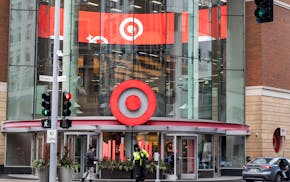UnitedHealth Group on Thursday joined the new club of very large American companies experiencing very large single-day stock losses, with a 22% drop wiping out $120 billion of shareholders' value.
The plunge marked investors' reaction to a substantially lower projection from UnitedHealth executives for the full-year performance of Minnesota's largest company.
It's a huge blow to the retirement and investment savings for the 19,000 employees at the company's Eden Prairie headquarters and offices around Minnesota.
The broader state economy will feel an impact from the gut punch UnitedHealth workers have taken, as they turn less optimistic about their own finances at a time when recession expectations are already growing. Politicians often try to draw a distinction between Wall Street and Main Street, but there is none.
Stock values hit all-time highs just two months ago. At such heights, investors have been extremely sensitive to bad news and quick to punish companies because of surprise events.
For instance, in late January, shares in AI chipmaker Nvidia fell 17% in one day, a loss of $579 billion in market value, when a Chinese company revealed a lower-cost way to deliver AI information.
More recently, President Donald Trump's on-again-off-again tariff policies soured investors on nearly all companies involved in international trade.
Over the last decade, UnitedHealth's revenue grew into the hundreds of billions of dollars. It joined the ranks of the nation's largest companies and today stands at No. 4, trailing only Walmart, Amazon and Apple.
Its market capitalization, computed by multiplying the share price times the total number of shares, followed suit. Before Thursday, UnitedHealth was worth $535 billion, putting it among the nation's top 20 most valuable companies. After Thursday's trading, it was worth $415 billion.
That $120 billion difference is more than any other publicly traded company based in Minnesota is worth. Medtronic, the second-most valuable company in Minnesota, has a market capitalization of $106 billion.
That $120 billion is nearly what the State of Minnesota will spend from its general fund over the next four years combined.
It's 400 times the spending cap of the Minnesota Vikings, and about what it would cost to build 110 stadiums for the team.
UnitedHealth's downbeat outlook ricocheted through the insurance sector, which investors had seen as insulated from Trump's cost-raising trade policy and resulting market tumult.
Before Thursday's announcement by UnitedHealth, analysts said the only thing that could hurt the company's momentum would be a shift in the mix of medical insurance usage.
That's precisely what UnitedHealth executives described in their announcement Thursday morning. They said they were seeing higher-than-expected usage in physician and outpatient services for Medicare Advantage patients, a business where margin pressure has been building.
Thursday was not the worst day ever for UnitedHealth's stock. The company, which formed in 1974 and went public in 1984, experienced volatility when it was younger and smaller.
The most recent worst one-day loss for UnitedHealth happened on Aug. 6, 1998, when shares fell 28%. Its annual revenue then was around $17 billion — 25 times less than today.

Ramstad: Minneapolis' Camden neighborhood is rising. Houston White wants to keep it that way.

Ramstad: Minnesota's big businesses are in crisis with a common problem

Ramstad: No business can 'eat' all the tariffs, not even Walmart

Ramstad: Donaldson is protected from tariff chaos after expanding globally the right way


